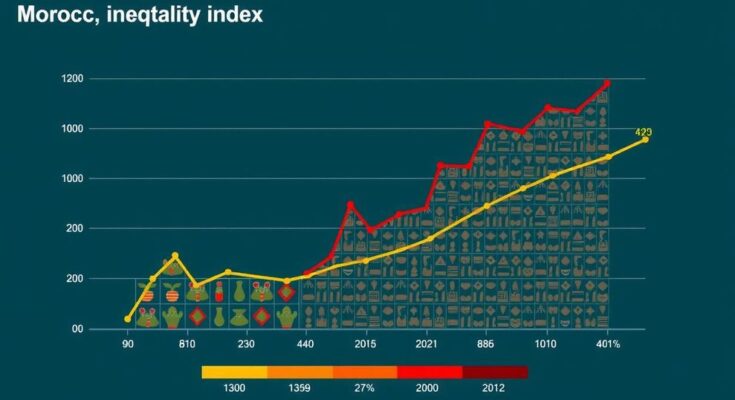Morocco ranks 73rd in the 2024 Commitment to Reducing Inequality Index, marking a significant improvement attributed to reconstruction efforts following the September 2023 earthquake. It is the top riser globally, particularly noted for its advancements in labor and education spending, despite concerns about long-term sustainability in its inequality reduction efforts.
Morocco has achieved notable advancements in the current 2024 version of the Commitment to Reducing Inequality Index, as recently reported on October 21 by Oxfam and Development Finance International (DFI). In this global evaluation that scrutinizes the dedication of 164 nations and regions in addressing economic disparity, Morocco secures the 73rd position. This achievement ranks the North African nation fifth among its regional counterparts in the Middle East and North Africa, following Israel, Jordan, Tunisia, and Algeria, positioned at 13th, 43rd, 59th, and 64th, respectively. Furthermore, Morocco’s standing surpasses that of Palestine, Egypt, Iran, Djibouti, Yemen, Oman, Lebanon, Iraq, and Bahrain within the same regional context. In the category of lower-middle-income nations, Morocco occupies the 11th rank, trailing Uzbekistan, while it is well ahead of Bolivia, Egypt, Eswatini, and Honduras. Notably, in the African landscape, it is South Africa, Mauritius, and Lesotho that lead the rankings. On a global scale, the top positions are held by Norway, Canada, Australia, Germany, and Finland. The report utilizes three core indexes: public services, taxation, and labor, wherein Morocco stands at 90th in public services, 97th in taxation, yet exhibits an exceptional 21st place in labor. This recent improvement has earned Morocco the distinction of being the highest riser in this edition, with the report denoting it as a “standout” due to significant post-earthquake expenditures aimed at reconstruction following the catastrophic earthquake in September 2023, which resulted in nearly 3,000 fatalities and the displacement of thousands. The substantial rise of 30 places since the 2022 index has positioned Morocco ahead of other countries demonstrating notable improvements, such as Malaysia, Paraguay, Eswatini, Canada, Spain, Ecuador, Moldova, the Democratic Republic of Congo, and Hong Kong. However, the report conveys caution, indicating that many of the leading nations in this edition, including Morocco, “may not stay there long.” It further comments, “The top riser, Morocco, moved up 96 places due to large post-earthquake relief and reconstruction spending.” Additionally, the report recognizes Morocco as one of the “top 10 education spenders,” attributing this to a 17% increase in the budget share devoted to education. This budgetary commitment not only pertains to the reconstruction of schools affected by the earthquake but also encompasses initiatives aimed at enhancing equity within the education sector, including free school meals and early childhood education programs designed to mitigate extreme inequality. Globally, the report raises concerns that nine out of ten countries are implementing policies that could exacerbate economic inequality. Furthermore, it highlights that 94% of countries that have obtained loans from the World Bank and the International Monetary Fund have disproportionately reduced crucial investments in public education, healthcare, and social safety nets over the preceding two years, a trend that is particularly pronounced in the world’s poorest countries, where 95% of IDA countries have imposed such cuts.
The Commitment to Reducing Inequality Index is a comprehensive assessment that evaluates the measures taken by countries to mitigate economic disparity. Conducted by Oxfam and Development Finance International (DFI), the index analyzes three main areas: public services, taxation, and employment conditions. The index serves as a vital tool for understanding how well nations are performing in combatting inequality and highlights significant disparities between different regions and income levels. The latest report reflects the impact of external factors, such as natural disasters, on economic policies, with particular attention given to the aftermath of the September 2023 earthquake in Morocco, which catalyzed increased public spending aimed at reconstruction and social programs.
In summary, Morocco’s significant rise in the 2024 Commitment to Reducing Inequality Index illustrates its decisive efforts to combat economic disparity, particularly through post-earthquake reconstruction spending. The country has achieved commendable rankings in labor and education expenditure, although the report advises caution regarding the sustainability of these advancements amid broader global trends toward rising economic inequality. As exemplified by Morocco’s experience, substantial humanitarian efforts following a disaster can lead to meaningful improvements in inequality metrics, underscoring the importance of strategic investment in social services and education to address the underlying issues of economic disparity.
Original Source: en.yabiladi.com




